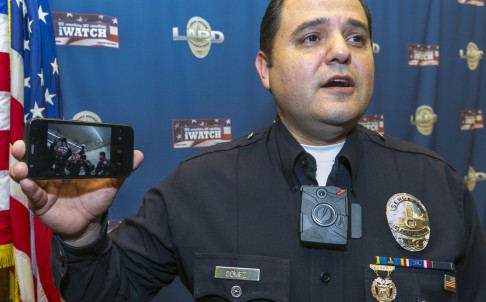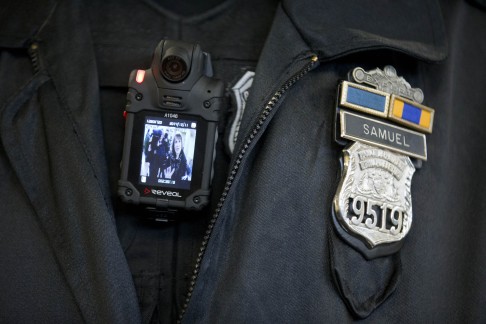LAPD to equip 7,000 policemen with body cameras amid outrage over unarmed blacks' deaths
PUBLISHED : Wednesday, 17 December, 2014, 11:49am
UPDATED : Wednesday, 17 December, 2014, 11:50am
Associated Press in Los Angeles

Los Angeles Police sergeant Dan Gomez demonstrates a video feed from his on-body camera, projected to his cellphone. Photo: AP
A US mayor has announced a plan to equip 7,000 police officers in his city with on-body cameras, in the wake of angry calls for more accountability in policing after several black men’s deaths at the hands of white officers ignited protests across the country.
Mayor Eric Garcetti’s plan would make the Los Angeles Police Department the nation’s largest law enforcement agency to move forward with such an ambitious expansion of the technology.
Los Angeles police commission president Steve Soboroff estimated the cameras would cost roughly US$10 million for the first two to three years and would include technology and software from Arizona-based Taser International.
After the outcry over the shooting of unarmed black teen Michael Brown in Ferguson, Missouri, and the ensuing jury decision not to indict the white officer responsible, President Barack Obama recommended spending US$74 million to equip another 50,000 officers with body cameras.
Garcetti said the city would be applying for part of those funds.
Protests were fuelled further beyond Ferguson after the white officer blamed for causing the death of Eric Garner in New York’s Staten Island in July was able to walk free without charge. The officer employed a banned chokehold on Garner, who was suspected of selling untaxed cigarettes, according to a video shot by a passerby.
The LAPD’s body-camera plan was unveiled at a news conference where Garcetti said he was planning to put forward millions of dollars next year’s budget for the cameras. The first wave of more than 800 cameras would roll out as early as January, he said.
“This is a huge step for law enforcement. No other major city is even close to implementation,” said Police Chief Charlie Beck.
The announcement follows a year of multiple field tests of the body cameras on a small number of the department’s 9,900 officers.

A study last year found that the cameras led to an 89 per cent drop in complaints against officers, possibly reining in misbehaviour on the part of the public and officers. Photo: AP
Nationally, officers in one of every six departments now patrol with tiny cameras on their chests, lapels or sunglasses, and that number is growing.
“What happens in the smallest town in these United States affects all of us. What happens in Ferguson, a town not even the size of one of the police divisions in LA, has affected us, but we’re stepping up,” Beck said.
Beck said the cameras will not be officially in use until a policy has been devised with consultation from stakeholders and the public. It must be approved by the civilian oversight commission and City Council.
“Body cameras won’t solve every problem in policing. But having video of police officers’ interactions with the public will help hold officers’ accountable for misconduct, quickly exonerate officers who are wrongly accused, and help the public understand the powers we give police and how they use them,” said Hector Villagra, executive director of the ACLU of Southern California.
Villagra said the most important part of the process would be setting the guidelines overseeing the new technology, such as when the cameras are turned on and off, or whether officers can review the recordings after using force.
Many law enforcement officials support cameras’ use and say they are effective. The police department in Rialto, California, found after a yearlong University of Cambridge study last year that the cameras led to an 89 per cent drop in complaints against officers, possibly reining in misbehaviour on the part of the public and officers, as well as ultimately limiting department liability.
The Los Angeles Police Protective League has been in favour of the cameras, but the union is still working out details on how the cameras will impact privacy and working conditions for officers, President Tyler Izen said.
